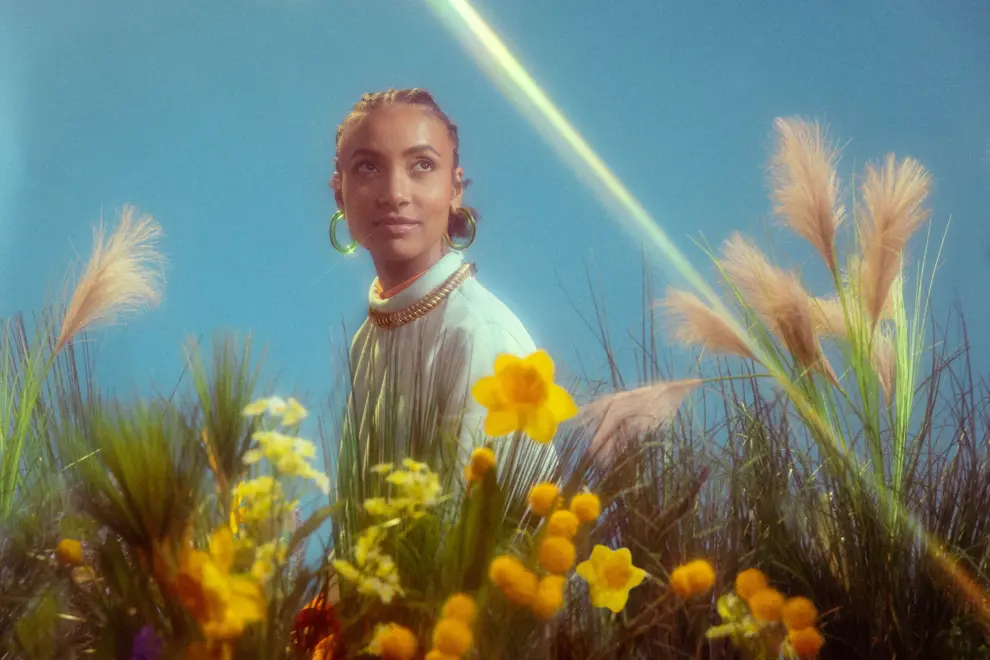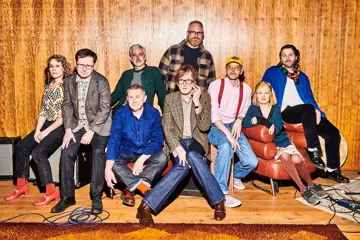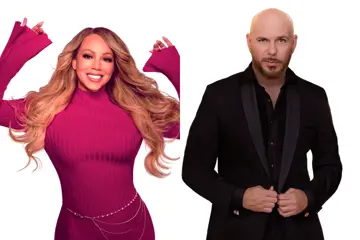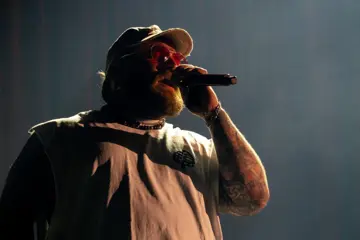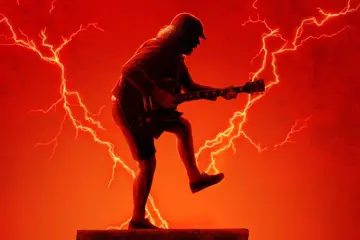 Esperanza Spalding
Esperanza SpaldingAn animated esperanza spalding—bassist, vocalist, and composer—is peering into her computer, searching for the name of a "wonderful" Brazilian musician whose album she recently heard but can't immediately recall. "I'm so sorry, but it's really cool," Spalding enthuses over Zoom. I would love to shout them out. They're a really awesome artist!"
Later spalding – who stylises her monicker in lower case – sends an email, IDing that music tip as Brazilian cantautora Luiza Brina's meditative Prece. But it's reassuring that the artist hailed by the US NPR (National Public Radio) as "the 21st century's jazz genius" can blank like the rest of us preoccupied with trying or mundane realities.
The five-time Grammy winner – on screen, all curls, charm and contemplation – is conducting interviews ahead of an Australian tour. She premiered here back in 2016, staging a theatrical show for Vivid Sydney.
This time, spalding will headline jazz festivals – starting with a spectacle at the Queensland Performing Arts Centre (QPAC) for the Brisbane International Jazz Festival, days after her milestone birthday. She's "just grateful – grateful to be invited and grateful to play."
spalding's innovative new set – both spanning repertoire and previewing her next evolution – has an intriguing premise, incorporating choreography. Indeed, she had a strange realisation in 2018. "I awoke to the fact that jazz is the only diasporic music that we don't dance to anymore," spalding says. "It's definitely not considered a social dance music anymore." She discerned a "weird rift" in disciplines – and pedagogies.
As part of her ongoing cultural "inquiry" into the nexus between the cerebral and corporeal, spalding reached out to choreographer Antonio Brown, liaising with his New York dance company. "I was leading [AntonioBrownDance] for the last two years studying these questions; working with these questions." She's now decided to further "explore" the idea of "reintegrating live improvisation-based music, jazz music, with improvisation-based dance."
Playing piano and double bass, spalding will lead her longtime guitarist Matthew Stevens – describing the Canadian as "a painter with sound" – and drummer/percussionist Eric Doob, a third Berklee College Of Music alumnus ("we probably did things in college, but it's like another life").
Rounding out her ensemble are contemporary dancers Tashae Udo and Kaylin Horgan, who bring a unique energy. "We are so upgraded and altered as instrumentalists being in actual dialogue with the moving body – it's really been revelatory for all of us, and I know for the dancers too."
The trajectory of spalding's career has been anything but predictable. The virtuoso grew up in a single-parent household in a historically Black neighbourhood in the progressive, countercultural but disproportionately white Portland, Oregon. Picking up the violin early, spalding was soon playing in a state orchestra.
Experimenting with other instruments, spalding then became enamoured of the stand-up bass. The teen began singing, fronting the band Noise For Pretend.
spalding landed scholarships, eventually studying at Berklee. On graduation, she joined the teaching staff.
In 2006, spalding debuted with Junjo, an ensemble project, through the Spanish label Ayva Musica. She even found a fan in Barack Obama, performing at the Nobel Peace Prize award ceremony. Yet spalding achieved wider success with 2010's Chamber Music Society, becoming the first jazz act to win the Grammy for 'Best New Artist' – and over Justin Bieber and Drake (who, slighted, contentiously addressed it in last year's For All The Dogs). spalding rematerialised with 2012's Radio Music Society – her aim to make jazz for the airwaves (Q-Tip had a production credit); the swinging City Of Roses a paean to Portland. She scored two more Grammies.
Still, increasingly uncomfortable with her status as a 'crossover' star, spalding temporarily retreated from the spotlight, preferring to be a side-person – although she cameoed on Janelle Monáe's The Electric Lady.
Prior to Vivid, spalding presented the bold Emily's D+Evolution – co-producing alongside Tony Visconti, famously David Bowie's cohort. With a concept reminiscent of Beyoncé Knowles' I Am… Sasha Fierce, Emily's D+Evolution (Emily is spalding's middle name) encompassed jazz, funk, rock and art-pop. "That was a big opening for me," spalding states today.
Emily's D+Evolution signified a reorientation as much as reinvention. "The kind of hit of inspiration, or coalescing of various things I was exposed to in that era, just made it so clear – like 'Oh, this is what I need to do.'“
Ever-imaginative, spalding summarises the album figuratively. "It's like a volcano erupting out of the middle of what I've gotten used to, and other people have gotten used to, seeing me as. It's erupting, the lava is going everywhere, and maybe, if there's the right circumstances or climates around, new land is being created too."
spalding has grown ever more radical as a fusionist. She helped the late legendary saxophonist Wayne Shorter fulfil his lifelong desire of composing an opera in Iphigenia, adapted from Euripides' Greek tragedy.
But the Brazilian music aficionado also collaborated with Milton Nascimento – over 40 years her senior – on this year's expansive Milton + esperanza.
The South American octogenarian had previously recorded with everyone from Shorter to Duran Duran – and spalding initially duetted with him on Chamber Music Society's Apple Blossom. The pair cut fresh renditions of Nascimento's standards, spalding originals, and covers of songs by The Beatles and Michael Jackson – Paul Simon among the guests.
Western society fosters generational divides (and ageism), with even pop culture defined by constant turnover, but jazz privileges lineage and intergenerational exchange via connection and community. "I'm trying to think how you could come up in this music and not be exposed to an intergenerational exchange—it is so much the fabric of this music."
However, for spalding, working with an elder such as Nascimento was intuitive. "When we're in the process of it, I'm not thinking like 'Oh, yeah, I'm doing this because it's an intergenerational celebration.' It's somebody that I love and admire. I was invited to do this and I wanna do my best 'cause I care about them as an artist."
In fact, spalding has been pondering the notion of "reciprocity". "For something like a musical art form, we can never reciprocate all that it's done for us – whether we're a listener or a journalist or a musician or a booker or whatever… What does reciprocity look like? One kind of response is simply naming this generation before you, inviting them into financial opportunities; sharing any financial gains garnered…"
The jazzer already has a new project in mind that relates to her interest in movement. "I envision it being an outgrowth of these years in the question of dance and music – or it's not really a question, so much as a healing, at least in my life, in my practice, of this rift," she divulges. "[It's] learning more about what happens when we're in those dimensions of human spirit expression simultaneously."
The work is still in progress – "I don't know yet what shape the project is gonna take" – but it'll be exemplary. "It's gonna be a manual, like some sort of instruction manual. I think that's all I can say."
Remarkably given her schedule, spalding has maintained a commitment to teaching. In 2017 she was engaged as Professor Of The Practice Of Music at Harvard University, only to resign five years on, citing the Ivy League institution's reluctance to respond to her BAEDAP (Black Artist-Educators Decolonizing And Placemaking) recommendations.
Returning to her Pacific Northwest hometown, spalding has since established the PRISMID Sanctuary – "a place in Portland, OR for Indigenous, Black & all POC artists and cultural workers to convene, rest, and heal."
"I'm feeling like 'Teaching is all day, every day,'" spalding observes. "Teaching is a discipline of doing my absolute best to clarify what I'm doing and why – and model what I mean."
Ask spalding if she consciously sets challenges for herself or rather goes with the flow, and she says "definitely" the latter ("always; trying to!").
The creative again uses a "metaphor" – of the realities faced by (urban) wildlife. "It all feels so challenging," spalding starts. "I mean, it's arduous, being an animal on the planet.
"I think about that… I'm grateful that the squirrels and the birds remind me every day, like, 'Oh, yeah, everything we need is here' – and it's arduous. It's like a lot of work. You gotta work a lot every day to tend yourself and do your thing in your environment.
"The struggle and the misery comes from not being able to accept that and efforting to try to keep ourselves, or our practice, in a comfort zone – and that actually takes more work.
"I think that's where we become stressful – and then there's fear of like 'Oh, no, this comfort will be taken from me' or 'I won't be able to sustain this…,' versus just welcoming, embracing, the fact like 'This is really hard; it's maybe difficult every day forever…'
As with those creatures, spalding strives to be reactive to her surrounds, where "there isn't a lot of room for projection or hypothesising," she notes.
"That's how I feel making things. I'm responding to what is real in my environment in that moment. My environment could be conversations I'm having with friends or a book that I read or a struggle I'm going through or a dream or whatever.
"But I feel all I can do, what I must do, is make what I have to make then based on what I'm experiencing or the inputs that are coming to me."
esperanza spalding returns to Australia this month, playing at QPAC, the Perth International Jazz Festival, and the Melbourne International Jazz Festival.

